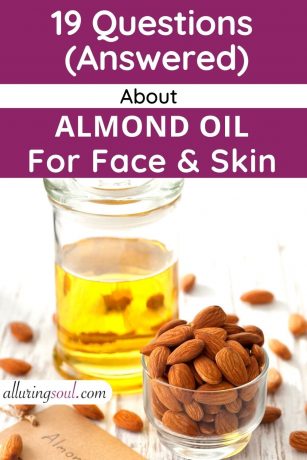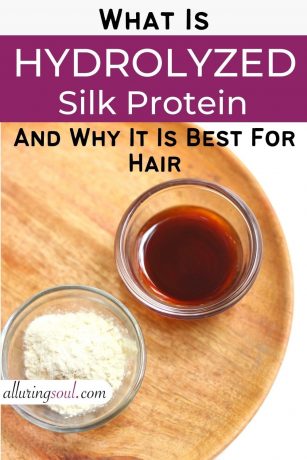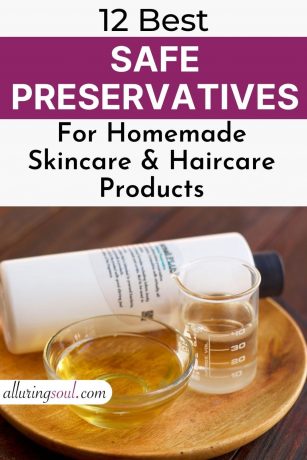If you have ever purchased a shampoo, moisturizer, or face cream, cetyl alcohol is one of the ingredients present in most cosmetic products. Unlike most alcohols, cetyl alcohol is a fatty alcohol that is good for skin and hair. It does not dry out the skin and hair. Cetyl alcohol works as a product or formulation thickener with moisturizing & conditioning capabilities.
In this article, let’s look at what is cetyl alcohol, how to use cetyl alcohol, and what are the benefits of using cetyl alcohol in your homemade products.
What Is Cetyl Alcohol?
Cetyl alcohol is derived from various plant oils such as coconut oil and palm oil. Cetyl Alcohol is a fatty alcohol that can be used as a thickener in lotions, salves, body butter, hair conditioners, shampoos, and more. It is waxy and acts as a co-emulsifier, stabilizer, and thickener for skincare and haircare products.
Cetyl alcohol thickens and adds body to the product as well as improves slip. It’s an emollient and it thickens or hardens the product without the weight or tackiness of wax.
Appearance – Cetyl alcohol appears as white flakes or pellets and has a slight waxy odor.
Solubility – Cetyl alcohol is soluble in oil and is added to the heated phase of the formulation.
Usage Rate – Generally, not more than 5% cetyl alcohol is required to be used in creams and conditioners. Using cetyl alcohol, the product attains a smooth and creamy texture that can be applied to hair and body easily.
Is Cetyl Alcohol “Alcohol-free”?
Yes, cetyl alcohol is “alcohol-free”. Cetyl alcohol is a fatty alcohol and does not contain any harmful alcohol. Fatty alcohols are good emollients and emulsifiers. Thus, even products that are labeled as “alcohol-free” can contain cetyl alcohol as it will not make the final products harmful for topical use.
Why Is Cetyl Alcohol Added In Skincare And Haircare Products?
The benefits of adding cetyl alcohol in skincare and haircare products are:
- Cetyl Alcohol Helps In Skin Barrier and Hydration-
Cetyl alcohol is a very good emollient. This means that it can form a protective layer on top of the skin and lock the moisture in. Cetyl alcohol also prevents damage to the skin from external factors by mending the barrier of the skin. This helps to prevent skin concerns like dermatitis. It keeps the skin hydrated and healthy. - Cetyl Alcohol Heals And Moisturises Dry Skin-
One of the best properties of cetyl alcohol is its ability to improve the quality of dry skin. Dry skin typically lacks moisture and appears cracked. As a moisturizer, cetyl alcohol adds moisture to dry skin and prevents it from cracking and flaking. - Cetyl Alcohol Works As A Co-emulsifier-
Cetyl alcohol is essentially a co-emulsifier in cosmetic products. This means that it helps to bind the oil and water together and creates a stable emulsion. - Cetyl Alcohol Stabilizes And Thickens The Products-
Cetyl alcohol is an excellent thickener. It not only helps to emulsify oil and water molecules but also stabilizes them so that the emulsion is long-lasting. Besides, it also adds texture, body, and volume to the products. Using cetyl alcohol, body products attain a thick and creamy texture. It helps the products to glide over the skin and hair smoothly. - Cetyl Alcohol Conditions Hair-
There is a reason why cetyl alcohol is used in almost every hair product. As it is a moisturizer, cetyl alcohol can smoothen the scalp and strands of hair. It conditions dry hair without greasiness and protects the hair from breakage and damage. Cetyl alcohol-based conditioners can reduce the frizz in hair. It makes the hair lustrous and prevents friction between the strands. - Cetyl Alcohol Acts As A Mild Surfactant-
Another reason why cetyl alcohol is used in conditioners is that it can act as a mild surfactant. It can lower the surface tension between water and the product. While one end of cetyl alcohol binds to water, the other end binds to grease and dirt separating it from the skin. This allows the oil and dirt suspended in cetyl alcohol to be washed away, giving way to cleansed skin and hair.
Is Cetyl Alcohol Natural?
No, cetyl alcohol is not natural but plant-derived. Cetyl alcohol can be obtained from palm oil or coconut oil and then further it is chemically processed to achieve the final product. However, due to the process of esterification and hydrogenation, approximately 95% of cetyl alcohol is natural.
Is Cetyl Alcohol Safe To Use?
Yes, cetyl alcohol is safe for use in homemade skincare and haircare products. FDA approves cetyl alcohol in the list of ‘safe and permitted food additives. Besides, the American College of Toxicology’s Cosmetic Ingredient Review classifies cetyl alcohol to be safe for use in products such as hair masks and lotions. Cetyl alcohol does not irritate the skin. Chemically, it is found to be non-toxic.
As the chemical composition of cetyl alcohol is different from that of simple alcohol, it does not make the skin dry or flaky. The long fatty acid chain of cetyl alcohol can trap the water molecules and keep them bound to the skin.
Is Cetyl Alcohol Vegan?
Yes, cetyl alcohol is a vegan product. The most modern procedures for making cetyl alcohol involve using palm oil or coconut oil, making it a vegan product.
Is Cetyl Alcohol Soluble In Water?
No, cetyl alcohol is not soluble in water. It is soluble in oil and is added to the heated oil phase of the formulation.
Is Cetyl Alcohol Bad For Oily Skin?
No, cetyl alcohol is not bad for oily skin. Cetyl alcohol has a comedogenic rating of ‘0’. This means that it does not clog the pores of the skin. Thus, cetyl alcohol is very gentle on oily skin. It can be used on oily skin without increasing the risk of breakouts, itching, or irritation.
Is Cetyl Alcohol Good In Making Lotion, Creams, Shampoo, And Hair Conditioners?
Yes, cetyl alcohol is one of the preferred ingredients for making lotions, creams, and hair conditioners. It acts as a product thickener by providing a body to the formulation. It makes creams and lotions silky, creamy, and easy to apply on skin and hair. It’s an emollient and it helps to thicken or harden the product without the weight or tackiness of wax.
Is Cetyl Alcohol Good For Hair?
Yes, cetyl alcohol is good for hair. As it is a fatty alcohol, it has moisturizing properties that are beneficial for dry and frizzy hair. Besides, cetyl alcohol can make the hair smooth and give a conditioned feel to it. It is also useful for detangling wet hair without causing any damage to it.
What Does Cetyl Alcohol Do For Your Face?
Being fatty alcohol, cetyl alcohol does wonders to your face. It has both moisturizing and emollient properties. This means that it forms a protective layer on your face and prevents moisture from being lost from the skin. Products containing cetyl alcohol are especially useful for those who have dry and flaky skin.
Is Cetyl Alcohol Bad For Sensitive Skin?
Although the Cosmetic Ingredient Review panel considers cetyl alcohol dermatologically safe for application, some issues are seen for those with sensitive skin.
There is some evidence that cetyl alcohol can trigger an allergic reaction for those with sensitive skin. This is due to its ability to alter the lipid bilayer of the epidermis. Thus for people with sensitive skin, or those suffering from psoriasis or eczema, it is recommended to do a patch test before proceeding to use any product that contains cetyl alcohol.
Can I Use Cetyl Alcohol Cream For The Face?
Yes, you can use cetyl alcohol creams for the face. Most formulators use cetyl alcohol in face creams as it makes a good moisturizer. Additionally, cetyl alcohol is non-comedogenic and non-toxic for all skin types. It can act as an emollient on the face without causing any acne.
Is Cetyl Alcohol Bad For Curly Hair?
No, cetyl alcohol is not bad for curly hair. On the other hand, it is found to be especially beneficial for curly hair types. Shampoos, conditioners, and hair masks for curly hair contain cetyl alcohol, as it moisturizes the hair, and makes it smooth and manageable. Cetyl alcohol does not break the curls of hair. Instead, it strengthens the hair shaft and makes curly hair look more bouncy and shiny.
Does Cetyl Alcohol Cause Breakouts?
No, cetyl alcohol does not cause any breakouts. Cetyl alcohol by itself can be used on all skin types, including those with oily, acne-prone skin. As it has a comedogenic rating of 0, it does not clog pores or cause breakouts.
However, you should be aware of products that contain cetyl alcohol with Ceteareth-20. This combination is particularly comedogenic and can cause breakouts.
What Is The Difference Between Cetyl Alcohol And Cetearyl Alcohol?
Cetyl alcohol and Cetearyl alcohol are both thickeners, used in making creams, lotions, and conditioners. The main difference between cetyl alcohol and Cetearyl alcohol is that Cetearyl alcohol is a combination of cetyl alcohol and stearyl alcohol, whereas, cetyl alcohol is standalone fatty alcohol itself.
Cetyl alcohol makes creams and lotions silkier, creamier than Cetearyl alcohol, and also Cetearyl alcohol makes the formulation thicker than cetyl alcohol.
Does Cetyl Alcohol Irritate Skin?
No, cetyl alcohol does not irritate the skin and is safe for most skin types. But some allergic reactions may be seen with the use of cetyl alcohol on sensitive skin with skin concerns like psoriasis and eczema.
Is Cetyl Alcohol A Preservative?
No, cetyl alcohol is not a preservative. Cetyl alcohol is a fatty acid used as a thickener in making lotion, cream, and conditioners.
Does Cetyl Alcohol Dry Out Hair?
No, cetyl alcohol does not dry out hair. Quite on the contrary, cetyl alcohol reduces the dryness in hair. Due to its highly moisturizing ability, cetyl alcohol adds a film of oil on the strands of hair without any greasiness. This drives out all the dryness and frizz in hair.
Is Cetyl Alcohol Bad For Eczema?
No, but in some rare cases, cetyl alcohol is seen to cause an allergic reaction for people with eczema. However, due to its moisturizing properties, cetyl alcohol is mostly beneficial for those who have eczema. So, always do a patch test before using cetyl alcohol-containing products before use.
What’s The Difference Between Stearic Acid And Cetyl Alcohol?
Both, cetyl alcohol and stearic acid are thickeners, that is, they thicken lotions and creams. The thickening effect of stearic acid is more than cetyl alcohol. Cetyl alcohol has conditioning and moisturizing properties but stearic acid has no such benefits for skin and hair. Cetyl alcohol makes cream and lotion creamier and silkier than stearic acid.
Thus cetyl alcohol is used in products that need to spread evenly over a large area of skin or hair without any frictions. On the other hand, stearic acid is used in products that are relatively thicker and will adhere to the skin much more.
What Is The Use Of Cetyl Alcohol In Hair Conditioner?
The purpose of a hair conditioner is to reduce the friction between free charges present in hair and make it smooth. As cetyl alcohol has good moisturizing properties, it can remove all the free charges and keep the hair sleek. Cetyl alcohol adds a ‘slip’ to hair, making combing easier.
Does Cetyl Alcohol Build Up On Hair?
Yes, cetyl alcohol has a slight build-up on the scalp. If a high percentage of cetyl alcohol is used in hair products it will be heavy and accumulate in between the hair strands adding to a build-up.
Is Cetyl Alcohol Good For High-porosity Hair?
Yes, cetyl alcohol is good for high-porosity hair. To understand how cetyl alcohol benefits high porosity hair, we have to understand the properties of this type of hair.
High porosity hair is dry and prone to breakage. It loses moisture easily and has a rough cuticle structure, which makes the hair frizzy with split ends and flyaways.
Cetyl alcohol, being a good moisturizer, coats the strands of hair with a thin film of oil. This reduces the dryness and frizz in the hair strands and makes them shiny. It also makes the hair smooth which reduces breakage during detangling of hair. By eliminating the roughness in the cuticles, cetyl alcohol also improves the strength and bounciness of hair.
What Are The Side Effects Of Cetyl Alcohol?
There are practically no side effects of using cetyl alcohol-based products for hair and skin. Cetyl alcohol’s emollient nature makes it useful for dry skin types. In rare situations, cetyl alcohol may bring an allergic reaction to the skin for those suffering from psoriasis or eczema.
If you see any redness, stinging or irritation from using any cetyl alcohol-based product, discontinue using that product immediately.
Table Showing The Properties Of Cetyl Alcohol-
| CETYL ALCOHOL | |
| What Is Cetyl Alcohol? | Cetyl alcohol is a fatty alcohol derived from coconut or palm oil. It is used as a thickener in making conditioners, lotions and, creams. |
| Appearance | Comes in white waxy flakes or pellets form. |
| Solubility | Solubles in oil and is added to the heated phase of the formulations. |
| Usage Rate | 1% – 30% (lower amounts are for water and oil emulsions, higher amounts are typically for anhydrous products like salves, body butter, etc.) |
| Is Cetyl Alcohol Safe For Sensitive Skin? | It is safe for most skin types. Might trigger a mild allergic reaction on sensitive skin. |
| Is Cetyl Alcohol Natural? | Plant-derived but not all-natural. |
| Does Cetyl Alcohol Cause Breakouts? | No. It has a comedogenic rating of ‘0’ |
| Best For Skin Types | All skin types, especially dry skin. |
| Why Use Cetyl Alcohol In Hair Care Products? | 1. Moisturizes the scalp and hair 2. Coats the hair with a thin film, protecting the strands 3. Removes free charges, reducing frizz, flyaway hair 4. Enables easy combing of hair |
| Is Cetyl Alcohol Vegan? | Yes. Cetyl alcohol is made from coconut or palm oil. |
| Does Cetyl Alcohol Dry Out Hair? | No. Cetyl alcohol has conditioning and emollient properties which makes hair soft and shiny. |
| What Are The Benefits Of Cetyl Alcohol For Skin And Hair? | 1. Locks moisture on the skin 2. Prevents dryness or flakiness of the skin 3. Keeps skin smooth and hydrated 4. Conditions the hair and keeps it smooth 5. Helps in detangling dry hair 6. Reduces frizz and breakage of hair |





No Comments